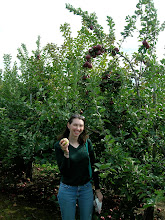



























As the menu planner and primary grocery shopper in my home, I am having a hard time doing those jobs in my post Omnivore’s Dilemma life. Michael Pollan forces us to think before we eat. I am fairly certain that this was the goal of the book- to make Americans think about where our food comes from. Here’s a hint: “the grocery store” is not the correct answer.
The correct answer is generally (but not always) “farms.” But not all farms are created equal. Most use chemical fertilizers and pesticides that strip the soil of its natural nutrients and poison the water supply. Some farms are “organic” by USDA standards (which some might consider too lenient) and still fewer are “organic” in a more traditional sense. Industry and fossil fuels have infiltrated just about everything we eat, from fruits, veggies, and grains, to beef, pork, and poultry. Industry has interfered with natural processes to turn a profit. Instead of cows grazing on ample pastures for a couple of years before being slaughtered, cows are fattened with corn over five months on a crowded feedlot. And the beautiful grasslands they used to graze on are transformed into more cornfields to fatten livestock and (unbeknownst to some of us) humans. It is more cost efficient for companies to raise livestock faster on less land, but the moral, environmental, and public health costs are often not considered. It needs to become profitable to raise crops and animals through healthy, natural methods and the only way this will happen is if people express demand for these products (or conversely, lack of demand in irresponsibly raised products.)
So how has this affected my grocery shopping?
I’ve stopped buying meat. I cannot endorse a system that crushes the true spirit of the livestock or that grossly pollutes the planet that I love and live on. This may be a temporary state of vegetarianism until I find a responsible local farmer, but even if or when that happens I know that I do not need to eat meat every day.
I’ve started buying some organic foods. Even though most organic foods that you’ll find in the store are what Pollan calls “industrial organic” he considers them a step above regular foods simply because that is a patch of land that does not have chemical fertilizers or pesticides on it. Apples are the number one fruit that we buy, so now I buy organic apples for twenty cents extra per pound. Call me crazy (Brett does) but I feel like they taste better! I also bought some Stonyfield organic yogurt on sale for cheaper than Yoplait! I love the packaging!


I’m still researching the best eggs and milk to buy. I just can’t bring myself to pay twice as much for organic milk if I’m not sure that my regular milk cows are being mistreated. As for eggs, I stood in front of the egg section for ten minutes trying to figure out what would be best. Cage-free? Organic? Vegetarian fed? I went with cage-free because I hated the image of laying hens crammed six to a cage so they can’t even move. According to the book, chickens left to their own devises like to eat grubs, so that’s why I didn’t go with vegetarian fed. I’m just not sure if that was the right decision.
The bottom line is: Read The Omnivore’s Dilemma! It will make you think about what you eat, pay attention to food in new ways, and seek change in this country’s agricultural habits.






